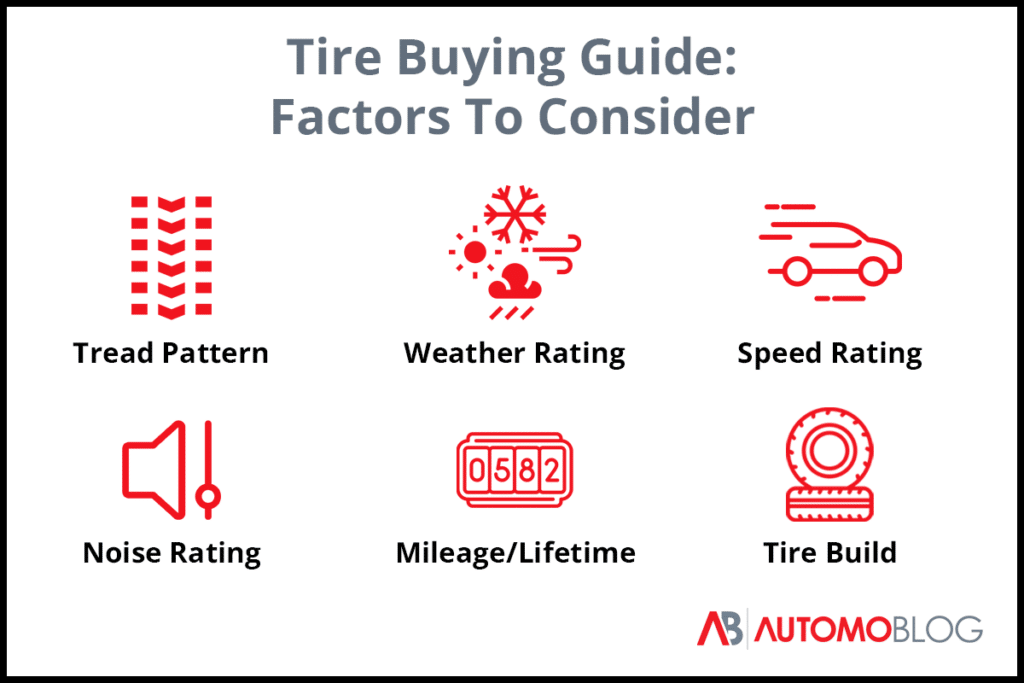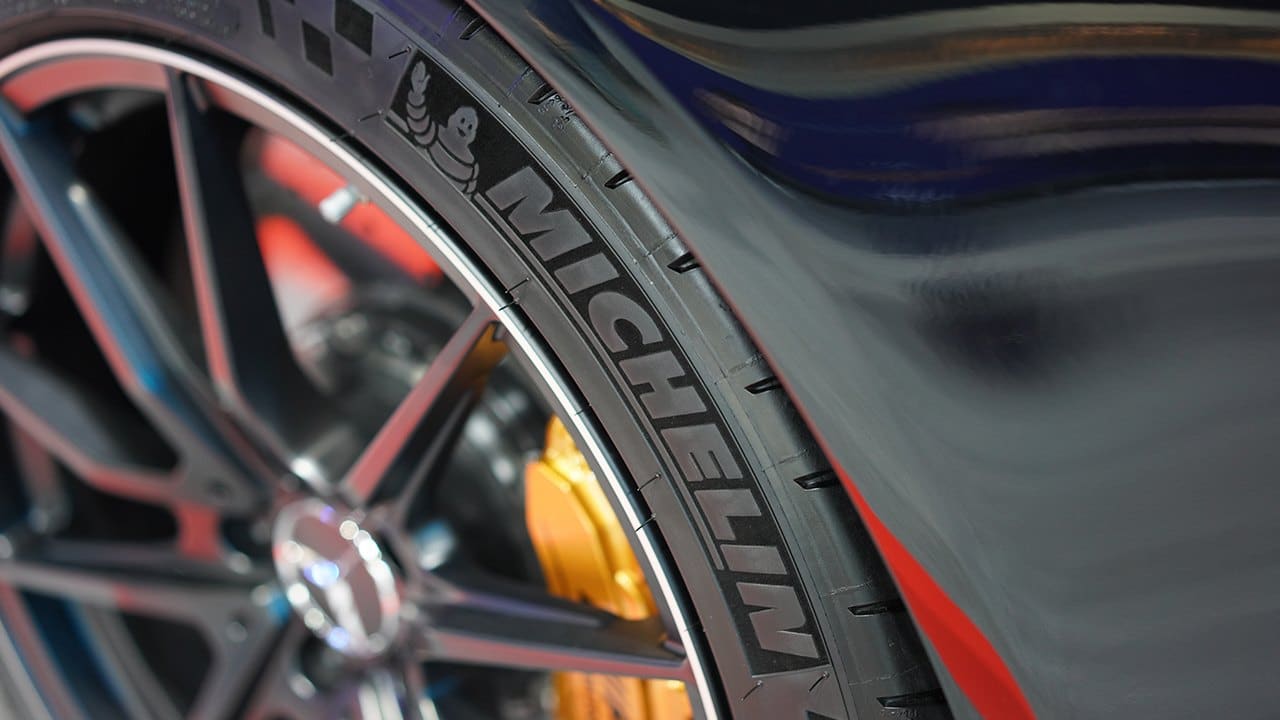Affiliate Disclosure: Automoblog and its partners may earn a commission when you use the services or tools provided on site. These commissions come to us at no additional cost to you. See our Privacy Policy to learn more.
- Michelin earned an overall score of 4.5 out of 5.0 in our most recent tire study, the highest of any provider.
- The company has one of the best reputations for quality in the industry.
- Michelin tires are some of the most expensive on the market and may not be an option for drivers on a budget.

Michelin tires have one of the automotive industry’s best reputations. That reputation lines up with what we found in our most recent tire study in which Michelin earned the highest score of any manufacturer and the award for Best Overall Tire.
In this article, we’ll break down why Michelin tires are considered some of the best tires in the business. We’ll take a look at Michelin as a whole – including industry ratings, popular tire models, tire costs, and customer reviews – to give you a better understanding of Michelin’s strengths and weaknesses.
About Michelin Tires
Founded in 1889 in Clermont-Ferrand, France, Michelin is one of the top-selling tire brands in the world. In 2019, Michelin accounted for almost 20% of North American tire sales, beating out other big competitors like Bridgestone and Goodyear. Michelin has grown in the past 30 years and acquired BF Goodrich and Uniroyal tire brands, making it an even bigger tire powerhouse.
Michelin tires go beyond just cars – the manufacturer also provides products for bicycles, motorcycles, airplanes, and Formula One motorsport vehicles. Currently, the brand’s North American headquarters is located in Greenville, South Carolina.
Within the industry, Michelin tires are known for their top-tier standards, rigorous testing, innovation, and long treadwear warranties – mileage limits reach 100,000 miles for certain models. Michelin is also one of the few manufacturers to offer a treadwear warranty for its winter tires, according to Edmunds.com.
Cost of Michelin Tires
It’s no secret that Michelin tires are expensive. According to TireBuyer, Michelin tires cost anywhere from $90 to $529, depending on the type and size of your tire. Most standard-size all-season Michelin tires for passenger cars, SUVs, and crossovers cost less than $200 each.
Although this is a little higher than other brands, the price largely reflects the quality of rubber Michelin uses, as well as its lengthier treadwear warranties.
Michelin Tires Industry Ratings
Michelin tires, like all tires, must follow a grading system created by the National Highway Traffic Safety Administration (NHTSA). This system is called Uniform Tire Quality Grading (UTQG), and it rates tires – except winter tires – based on their treadwear, traction, and temperature resistance.
UTQG Grading Criteria
Here’s what each grade says about your tires:
Treadwear
This grade estimates the longevity of your tires. To calculate treadwear, tires are measured against a control tire given a rating of 100. If a tire has a 500 treadwear rating, that means it lasted five times longer than the control. Most passenger tires have between a 300 and 500 treadwear rating, according to data from SaferCar.gov.
Traction
This grade measures how well your tires “grip” a wet road. Traction grades are given on a scale of AA, A, B, or C. Good day-to-day tires typically have an A rating.
Temperature
This grade measures a tire’s heat resistance on a scale of A, B, or C. Tires need to withstand high temperatures due to their designs and how quickly they rotate.
Michelin Tire UTQG Grades
Below, we’ve compiled a few popular Michelin tires and their UTQG scoring using data from NHTSA.gov (formerly hosted at SaferCar.gov).
| Michelin Tire Model | Tire Type | Treadwear Score | Traction Score | Temperature Resistance |
|---|---|---|---|---|
| Michelin Defender T+H | Passenger All-season | 820 | A | A |
| Pilot Sport A/S 3 Plus | High-performance All-season | 500 | AA | A |
| Michelin Premier A/S | Performance touring All-season | 640 | A | A |
| Michelin LTX M/S2 | Truck/SUV All-season | 720 | A | A |
However, it’s important to note that the NHTSA does not conduct these tests. Manufacturers and independent companies are responsible for tire testing. If you’re curious about a Michelin tire you already own, you can check the tire’s sidewall for the UTQG grade.
Michelin’s Most Popular Tire Models
Michelin tires come in a variety of models, most of which are top performers in their categories. For passenger cars, trucks, and SUVs, Michelin sells some of the most popular tire models on the market.
Using data from TireBuyer, a few of Michelin’s highest-rated tires include:
- Michelin Defender T+H: One of the longest-lasting tires available for passenger cars
- Michelin LTX M/S2: A highway all-season tire that aids with comfort, noise reduction, and braking effectiveness
- Michelin Pilot Super Sport: Offers an increased handling ability and longer tread life than other performance tires
- Michelin X-Ice Xi3: Provides research-backed elite traction in inclement winter weather and is available for coupes, sedans, vans, and crossover vehicles
Each of the tire models listed performs above average in terms of treadwear, traction, and temperature resistance when compared to competitors’ models.
Michelin Tire Buying Guide
You’re all but guaranteed a great-quality tire when you buy from Michelin. But even the highest-quality tire in the world won’t offer optimal performance if it’s not the right tire. Understanding the factors that differentiate tires, how to find the right fit, and your own driving habits and preferences is essential to getting the best tire for your needs.
Michelin Tires Factors To Consider

There are several factors that differentiate one car tire from another and determine their ideal application. Learning what these factors are and how they relate to your vehicle, the climate where you live, and the way you drive can help you make an informed decision about your new tires. These factors include:
- Weather rating: Many tires are rated as all-weather tires, meaning they perform well under most weather conditions. Some tires, however, are designed for more specific conditions. Summer tires, for example, are built to hold their shape in warmer temperatures.
- Speed rating: Manufacturers list a maximum safe speed with every tire. Exceeding this speed can be very dangerous, which is why drivers who enjoy going fast should be especially considerate of this rating.
- Tire build: Most tires are built using either radial, bias-ply, or bias-belted construction. Radial tires are typically more durable overall, while bias-built tires tend to have stiffer sidewalls and a more affordable price tag.
- Tread pattern: Most tread designs fall into the categories of diagonal, asymmetrical, symmetrical, or combination pattern.
- Tread life: Tire manufacturers typically list the expected lifetime of their tires in terms of miles.
- Noise rating: Tires can generate a lot of noise that’s audible to people inside the cabin. Some companies design certain tires to run more quietly. The difference between these and other tires can be quite significant.
How To Read Michelin Tire Sizes
Michelin and other tire manufacturers use a standard format to describe the dimensions of tires. Understanding what each part of this listing means is important to getting the right fit. To break down the components of these size listings, we’ll use the common tire size of P225/65R17 as an example.
- P: The first letter in the size description denotes the type of vehicle the tire is intended for. Our example tire has a “P” which indicates that the tire is designed for passenger vehicles.
- 225: The first number in the label provides the width of the tire in millimeters. Therefore, we know that our example tire is 225 millimeters wide.
- 65: The second number indicates the ratio of the tire’s height compared to its width as a percentage, meaning our example tire is 65% as tall as it is wide.
- R: The second letter in the label describes the type of tire build. In this case, the “R” stands for radial construction.
- 17: The final number in the listing indicates the diameter of the wheel the tire fits in inches. This means that our example tire is designed to fit a 17-inch rim.
Michelin Tire Warranties
Michelin offers both original equipment (OE) and replacement tires, but its OE options are not covered under a mileage warranty. All replacement models are covered under a six-year Michelin Promise Plan.
This limited warranty covers any defects in workmanship or materials. Some Michelin tires also come with a mileage warranty, which guarantees your tread lasts for a certain number of miles.
All Michelin tires come with a 30-day satisfaction guarantee. This allows you to return your tires within 30 days of purchase if you’re not happy with your tires. To get your money back, you’ll need to return to the place you bought the tires and provide a receipt.
Michelin Customer Reviews
To give you a better idea of Michelin tires and their overall quality, we compiled a few customer reviews from TireBuyer. Across the board, Michelin tire reviews are positive. Customers are often impressed with their durability and long-lasting tread life. However, one or two Michelin models did miss the mark.
Here’s an overview of customer experiences with Michelin tires:
Positive Experiences with Michelin Tires
“The [Michelin LTX A/T2] came stock on my 2019 F-250. At 12,000 miles, they don’t show any wear… My biggest surprise is how well they do in mud. I’ve pulled the trailer through some fairly deep, nasty mud. I had to use four-wheel drive, but these tires threw the mud all over the truck/trailer and kept the tread clear.”
– SOMD Dan via TireBuyer
“Bought my Suburban new with a set of [Michelin Energy Saver A/S] tires. Just now replacing for the first time at 72,000 miles. Definitely notice a much better fuel economy… All-around, a great tire to buy. I drive a lot (45,000 to 75,000 miles a year), so really happy I found this product.”
– Glen via TireBuyer
Negative Experiences with Michelin Tires
“The [Michelin Premier LTX] is almost worn out at 22,000, mostly long-distance road miles. I have rotated them every 5,000 miles. I had to have them rebalanced twice, and they actually hydroplaned on me once. Never had a tire to do that.”
– Jack via TireBuyer
“I have a Corvette C7 Z06. I bought the Michelin Pilot Sport Cup 2 tires for track day. They did hold the track very well. My problem is, I wore them out in one day. That’s a little too expensive for me.”
– Steve via TireBuyer
Michelin Tires: Conclusion
We gave Michelin tires 4.5 out of 5.0 stars and recognized the manufacturer for having the Best Tires Overall in our most recent tire study. Michelin’s many quality tire options, positive customer reviews, and shining industry reputation make it a smart choice for most drivers.
The only major drawback with Michelin tires is the high price point. Drivers on a budget may need to consider other options.
Michelin Tires: Top Competitors
If you want to compare Michelin tires with a few of our other top recommended tire manufacturers, we recommend checking out Cooper and Pirelli. These brands also scored highly in our industry-wide review and may offer strong tire options for your vehicle.
Cooper: Most Affordable
If Michelin tires are out of your price range, consider purchasing Cooper tires. According to TireBuyer, Cooper tires range from about $65 to $475, depending on the type and size of the tire. An independent tire manufacturer, Cooper products are mostly sold online or through participating dealerships.
Compare rates for Cooper tires at TireBuyer.com.
Pirelli: Best for High-Performance
Italian-manufacturer Pirelli is known for its high-performance tires for luxury and exotic car brands. However, the tire company also makes tires for day-to-day cars, trucks, and SUVs. You’ll pay a high price, but the tires you get from Pirelli are high-quality and provide great grip during wet or dry conditions.
Compare rates for Pirelli tires at TireBuyer.com.
Michelin Tires: FAQ
Are Michelin tires good quality?
Michelin tires are good quality. The company has one of the strongest reputations for quality tires in the industry.
Are Michelin tires made in China?
Some Michelin tires are made in China. The company recently invested in a large manufacturing plant in Shenyang, China.
What does a Michelin tire cost?
The cost of Michelin tires ranges from around $90 to $530 per tire. The brand is one of the most expensive on average in the industry.
Is Michelin owned by Goodyear?
Michelin is not owned by Goodyear. It is a publicly-owned and traded company.
Our Methodology
Our research team is committed to providing the most accurate, thorough, and unbiased information possible to help people make informed decisions about the tires they purchase. We use a standardized set of criteria to ensure the consistency and comparability of our reviews.
- Industry Reputation: To assess the overall reliability of each company, we looked at industry ratings from organizations like the Better Business Bureau (BBB) and more, along with the company’s longevity and other factors.
- Tire Variety: Our team considered the full range of each manufacturer’s tire lineup, giving higher scores to companies that offered larger and more diverse selections.
- Affordability: Costs are an important consideration when buying tires. We evaluated the price range of each company’s products to determine its affordability relative to competitors.
- Customer Satisfaction: Our researchers scoured the internet for reviews from customers to assess how satisfied people are with their brand experience. We considered review scores as well as looked for consistent patterns of complaints or praise.


